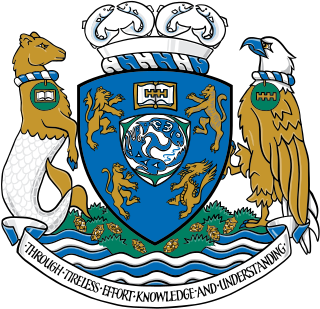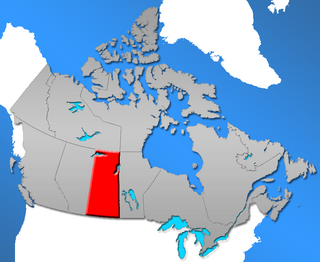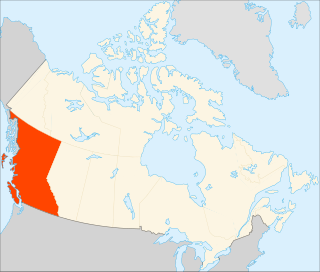Related Research Articles

A college is an educational institution or a constituent part of one. A college may be a degree-awarding tertiary educational institution, a part of a collegiate or federal university, an institution offering vocational education, a further education institution, or a secondary school.

A community college is a type of undergraduate higher education institution, generally leading to an associate degree, certificate, or diploma. The term can have different meanings in different countries: many community colleges have an "open enrollment" for students who have graduated from high school. The term usually refers to a higher educational institution that provides workforce education and college transfer academic programs. Some institutions maintain athletic teams and dormitories similar to their university counterparts.

Vocational education is education that prepares people for a skilled craft as an artisan, trade as a tradesperson, or work as a technician. Vocational education can also be seen as that type of education given to an individual to prepare that individual to be gainfully employed or self employed with requisite skill. Vocational education is known by a variety of names, depending on the country concerned, including career and technical education, or acronyms such as TVET and TAFE.
Education in Quebec is governed by the Ministry of Education and Higher Education. It was administered at the local level by publicly elected French and English school boards, changed in 2020 to school service centres. Teachers are represented by province-wide unions that negotiate province-wide working conditions with local boards and the provincial government of Quebec.

Education in Canada is for the most part provided publicly, and is funded and overseen by provincial, territorial and local governments. Education is within provincial jurisdiction and the curriculum is overseen by the province. Education in Canada is generally divided into primary education, followed by secondary education and post-secondary. Within the provinces under the ministry of education, there are district school boards administering the educational programs.

A state school or public school is a primary or secondary school that educates all students without charge. Such schools are funded in whole or in part by taxation.

A vocational school, trade school, or technical school is a type of educational institution, which, depending on the country, may refer to either secondary or post-secondary education designed to provide vocational education or technical skills required to complete the tasks of a particular and specific job. In the case of secondary education, these schools differ from academic high schools which usually prepare students who aim to pursue tertiary education, rather than enter directly into the workforce. With regard to post-secondary education, vocational schools are traditionally distinguished from four-year colleges by their focus on job-specific training to students who are typically bound for one of the skilled trades, rather than providing academic training for students pursuing careers in a professional discipline. While many schools have largely adhered to this convention, the purely vocational focus of other trade schools began to shift in the 1990s "toward a broader preparation that develops the academic" as well as the technical skills of their students.

Kwantlen Polytechnic University (KPU) is a public degree-granting undergraduate polytechnic university in British Columbia, Canada, with campuses in Surrey, Richmond, Cloverdale, Whalley, and Langley. KPU is one of the largest institutions by enrolment in British Columbia garnering a total of 20,000 students and 1,400 faculty members across its five locations, encompassing the gestalt of the Metro Vancouver district. KPU provides undergraduate and vocational education including bachelor's degrees, associate degrees, diplomas, certificates, apprenticeships, and citations in more than 140 diverse programs.

Bow Valley College is a Canadian public, board-governed college located in Calgary, Alberta, operating as a comprehensive community institution under the Post-Secondary Learning Act of Alberta. The branch campuses are: Airdrie, Banff, Cochrane, Okotoks, and Strathmore. Bow Valley College is a member of the Alberta Rural Development Network and Colleges and Institutes Canada.
Education in Alberta is provided mainly through funding from the provincial government. The earliest form of formal education in Alberta is usually preschool which is not mandatory and is then followed by the partially-mandatory kindergarten to Grade 12. This is managed by Alberta Education which has divided the province into 379 school authorities. Higher education in the province is managed by Alberta Advanced Education.

Higher education in Canada includes provincial, territorial, indigenous and military higher education systems. The goal of Canadian higher education is to give every Canadian the chance to gain the skills and knowledge they need to reach their fullest potential. It builds a world-class workforce, increases the number of Canadians working, and secures Canada's long-term prosperity. Higher education programs are crafted from the employee's viewpoint in mind, aiming to minimize risks and providing guaranteed outcomes.

Newfoundland and Labrador has had the same growing pains as other provinces in developing its own form of education and now boasts a very strong, although relatively small, system. The direction of Newfoundland and Labrador's policy has evolved rapidly since the late 1990s, with increased funding, participation rates, accessibility and transferability. Many of the directives the government has been acting upon in the past 10 years have been a result of recommendations that stemmed from a 2005 white paper: Foundation for Success: White Paper on Public Post-Secondary Education. It set the course for furthering the strategic directives of the provincial post-secondary education sector. Some of its recommendations aimed to:

Higher education in Manitoba includes institutions and systems of higher or advanced education in the province of Manitoba.

Historically, Saskatchewan's higher education system has been "significantly shaped" by demographics. In 1901, six years prior to the 1907 founding of a university in Saskatchewan, the urban population in Saskatchewan was 14,266 (16%) while the rural population was 77,013 (84%). One hundred years later, the proportions had changed significantly: urban population in 2001 was 629,036 (64%) while the rural population was 349,897 (36%). Over time the province's higher education system has changed significantly in response both to this demographic shift and to provincial politics.

Higher education in Alberta refers to the post secondary education system for the province of Alberta. The Ministry of Advanced Education in Alberta oversees educational delivery through universities, publicly funded colleges, technical institutions, and private colleges. These institutions offer a variety of academic and vocational pursuits. Students have access to post-secondary options through most regions of Alberta, and a developed articulation system allows for increased student mobility.

Higher education in British Columbia is delivered by 25 publicly funded institutions that are composed of eleven universities, eleven colleges, and three institutes. This is in addition to three private universities, five private colleges, and six theological colleges. There are also an extensive number of private career institutes and colleges. Over 297,000 students were enrolled in post-secondary institutions in British Columbia in the 2019-2020 academic year.

In Canadian English, the term college usually refers to a career college, technical, trades, community college, college of applied arts or applied technology, or an applied science school. These are post-secondary institutions granting apprenticeships, citations, certificates, diplomas, and associate's degrees.
References
- 1 2 3 4 5 6 7 8 "Types of publicly funded institutions". www.alberta.ca. Government of Alberta. 2024. Retrieved 5 February 2024.
- 1 2 "Private career colleges". www.alberta.ca. Government of Alberta. 2024. Retrieved 5 February 2024.
- 1 2 "Designated post-secondary institutions". Government of Alberta. 2024. Retrieved 5 February 2024.